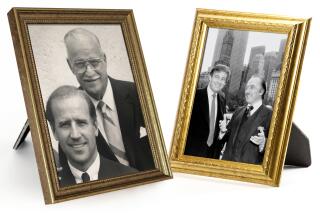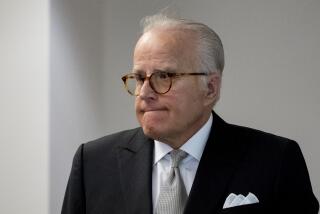THE WHITE HOUSE / FAMILY MATTERS : Some Presidential Problems Are Relative : Bush is among many chief executives plagued by the actions of their kin.
WASHINGTON — “I have confidence in the honor and integrity of my son,” said President Bush last week as that son, Neil, increasingly became a lightning rod for critics of the Administration’s handling of the burgeoning savings and loan scandal.
Bush thus became the latest in a long line of presidents and prospective presidents who have been forced to defend their kin--and their own reputations--against allegations of misconduct.
The final judgment on the charges that Neil Bush violated conflict-of-interest rules in his role as a director of a now-defunct Denver savings and loan is still months in the offing. Nevertheless, history suggests that, just as the savings and loan fiasco will take a heavy financial toll on the average taxpayer, Neil Bush’s involvement is likely to extract a substantial political price from his father.
Controversy over presidential kin goes back to the early days of the republic. But the political consequences have grown as a result of television, which presidents have used to personalize their appeal and promote their families.
Moreover, problems involving relatives have had an extra political jolt when they appeared to reinforce a perceived flaw in a leader’s political profile. For example, Richard M. Nixon’s unsuccessful presidential candidacy in 1960 was marred by the disclosure that his younger brother, Donald, had received a $205,000 loan from industrialist Howard Hughes, who subsequently, it was alleged, received favorable treatment from various federal agencies.
No evidence was ever produced that Richard Nixon had used his influence to get special concessions for Hughes. “But the story would not die,” as Nixon biographer Stephen Ambrose wrote. One apparent reason: The allegations matched the reputation Nixon had acquired early on for being insufficiently scrupled--an image underlined by the “Tricky Dick” label applied by his foes.
Similar misfortune befell Jimmy Carter in the midst of his losing 1980 reelection campaign, when his brother, Billy, accepted $220,000 from Libya to help improve that country’s villainous image in the United States.
Charges that Billy had helped the Libyans procure U.S. airplanes and other equipment flew thick and fast. “The Libyan mess . . . was wreaking havoc with our efforts to deal with anything else on the political scene,” President Carter later wrote in his memoirs. Finally, the President was obliged to hold an hourlong press conference, during which he managed to refute the charges.
Still the political damage had been done, in large part because the “Billygate” episode appeared to lend credence to the overall public impression that Carter had lost control of his own presidency--an impression he himself had fostered by proclaiming the country to be in a state of “malaise.”
These precedents spell potential trouble for President Bush, analysts believe, because they indicate that the allegations against Neil Bush might well remind voters of one of President Bush’s own long-term political handicaps--his privileged background.
Of Neil Bush’s circumstances, one Republican consultant who preferred not to be identified said: “People are going to start thinking about how a young guy like that happened to get on a bank’s board of directors.”
And the consultant cited another attention-getting issue: a $100,000 investment made for the President’s son by one Denver businessman with the understanding that the money need be repaid only if the investment turned a profit.
Such evidence of special advantages for Neil Bush “can revive the image (President) Bush has of being born with a silver spoon in his mouth,” said Gary Orren, a media specialist at Harvard’s Kennedy School of Government.
That is just the perception Bush has been trying to overcome most of his political life, with only mixed success.
In his autobiography, after recounting efforts “to blunt the media impression that I was ‘elitist,’ ” Bush concluded that “the charge that I was part of a preppy conspiracy to take over the government was just something I’d have to live with.”
The worry Bush faces now is that the Neil Bush case may make living with the charge that much harder.
More to Read
Get the L.A. Times Politics newsletter
Deeply reported insights into legislation, politics and policy from Sacramento, Washington and beyond. In your inbox three times per week.
You may occasionally receive promotional content from the Los Angeles Times.










